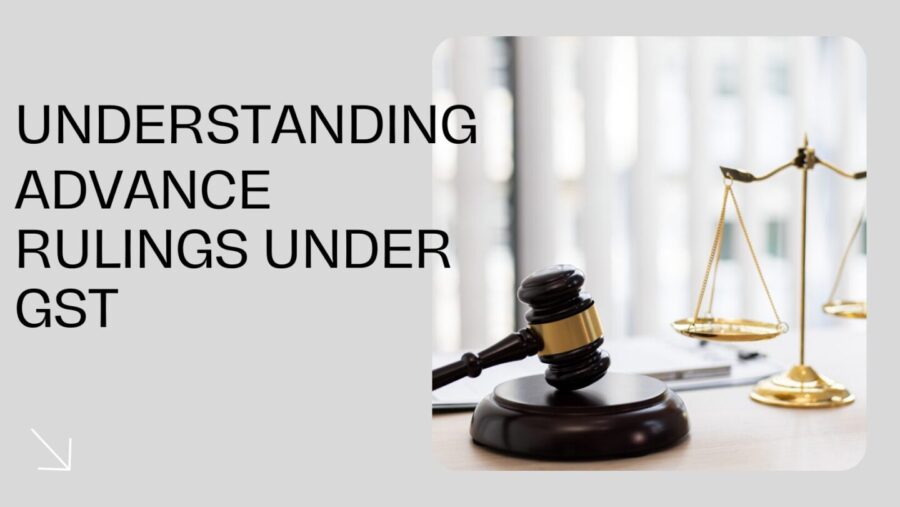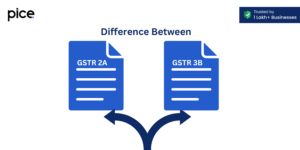Advance Tax Ruling under GST
- 11 Aug 24
- 17 mins

Advance Tax Ruling under GST
Key Takeaway
- Advance Ruling under GST provides businesses with preemptive clarity on tax obligations, enhancing compliance and reducing litigation.
- The mechanism aids in informed business planning by offering authoritative decisions on tax matters before transactions are executed.
- Advance Rulings are crucial for ensuring that businesses can navigate the complexities of GST with confidence and certainty.
- The process for obtaining an Advance Ruling is designed to be transparent, efficient, and accessible, requiring submission of a detailed application and a prescribed fee.
- Rulings issued by the Advance Ruling Authority are binding on the applicant and the concerned tax authorities, ensuring legal certainty and predictability.
Within the complex network of tax regulations governing Indian businesses, the launch of the Goods and Services Tax (GST) signaled a transformative change aimed at streamlining the tax framework, promoting ease of doing business, and improving tax compliance. During this change, the concept of Advance Ruling under GST emerges as a beacon of clarity, offering businesses a preemptive insight into their tax obligations and entitlements. This mechanism serves not only as a means to prevent disputes but also as a strategic resource for enterprises seeking to traverse GST's intricacies with assurance and precision.
Advance Ruling under GST acts as an essential consultative service, enabling taxpayers to request a definitive explanation on multiple facets of the GST legislation pertaining to a transaction they propose to undertake or are involved in. This facility is instrumental in preempting tax disputes by providing authoritative decisions on specific tax matters before the transactions are executed. Such rulings help in ensuring that businesses are not left in ambiguity regarding their tax liabilities and can make informed decisions that are in compliance with the GST framework.
Advance Ruling in GST: Purpose, Procedure, and Regulations

The Goods and Services Tax (GST) regime in India, with its comprehensive approach to indirect taxation, aims to streamline the tax structure and increase transparency across the nation's economic landscape. A pivotal feature of this regime is the provision for Advance Ruling, a mechanism designed to enhance clarity and predictability for taxpayers regarding their tax obligations. This section delves into the purpose, procedural intricacies, and regulatory framework governing Advance Rulings under GST, shedding light on how it serves as a navigational aid in the complex sea of tax compliance.
Purpose of Advance Ruling
The main goal of the Advance Ruling mechanism is to offer taxpayers transparency regarding the tax consequences of their business dealings before initiation. This foresight helps in mitigating potential disputes with tax authorities, thereby reducing litigation and fostering a compliant and more predictable tax environment. Specifically, Advance Rulings aim to:
- Clarify Tax Liabilities: Businesses can ascertain their tax liabilities in advance, particularly in complex transactions where the tax implications might not be clear-cut.
- Facilitate Compliance: By understanding their tax obligations beforehand, taxpayers can ensure compliance with GST laws, thereby avoiding penalties and interest that accrue from non-compliance.
- Boost Confidence among Taxpayers: The certainty provided by Advance Rulings boosts taxpayer confidence, encouraging them to undertake significant investments and business activities without the fear of unforeseen tax implications.
- Aid in Business Planning: With clear knowledge of the tax structure applicable to their transactions, businesses can plan their activities more efficiently, incorporating tax costs into their project budgets accurately.
Procedure for Obtaining an Advance Ruling
The procedure for obtaining an Advance Ruling under GST is meticulously structured to ensure transparency, efficiency, and accessibility. The key steps involved are:
- Successful Submission: Taxpayers seeking an Advance Ruling must submit an application in the prescribed format (FORM GST ARA-01), along with the requisite fee. The application must detail the specific question on which the Advance Ruling is sought.
- Examination by the Authority: Upon receiving the application, the Advance Ruling Authority examines the details provided to ensure that the question is within their purview and that the issue is not already pending or decided in any other forum.
- Hearing: The Authority may then call for a hearing where the applicant and the tax authorities can present their case.
- Ruling Issuance: Based on the examination and hearings, the Authority issues a ruling within a stipulated timeframe, typically within 90 days of the application's receipt.
Regulations Governing Advance Rulings
The regulatory framework for Advance Rulings under GST is preserved in the GST Act and the rules formulated. These regulations specify:
- The scope of questions on which an Advance Ruling can be sought, including classification of goods and services, applicability of tax rates, admissibility of input tax credit, and determination of the place of supply.
- The authority's composition, which includes Jurisdictional officers from both central and state tax departments, ensuring a balanced and comprehensive examination of the applications.
- The binding nature of the rulings on the applicant and the concerned tax authorities, applicable only to the person who has sought the ruling and in respect of the transaction for which it was sought.
- The procedure for appeal against the ruling by aggrieved parties, which must be filed within a specified period.
Advance Rulings under GST represent a critical tool for taxpayers seeking to navigate the complexities of tax compliance with confidence. By providing clarity on tax obligations in advance, the mechanism not only aids in dispute avoidance but also facilitates informed business decision-making, thereby contributing to a more stable and predictable tax environment.
The Importance of Advance Ruling within the GST Framework
The Goods and Services Tax (GST) framework, designed to unify India's complex tax system into a single, comprehensive regime, has significantly transformed the business landscape. Within this framework, the Advance Ruling mechanism plays a pivotal role, serving as a cornerstone for tax clarity and compliance. Its importance is multifaceted, impacting taxpayers, tax authorities, and the overall efficiency of the GST system. This section explores the critical benefits and significance of Advance Ruling within the GST framework.
- Enhancing Legal Certainty and Predictability: One of the primary benefits of Advance Ruling is the legal certainty it provides to taxpayers. By allowing businesses to understand the tax implications of their transactions in advance, it significantly reduces the scope for ambiguity and interpretation disputes. This predictability is crucial for long-term business planning and decision-making, enabling companies to forecast their tax liabilities accurately and allocate resources more efficiently.
- Facilitating Compliance and Reducing Litigation: Advance Rulings help in simplifying compliance procedures for taxpayers by providing clear guidelines on the application of tax laws to their transactions. This clarity reduces the likelihood of unintentional non-compliance and, consequently, the risk of disputes with tax authorities. By diminishing the potential for litigation, Advance Rulings contribute to a more harmonious relationship between taxpayers and tax authorities, saving both parties time and resources that would otherwise be spent in legal battles.
- Promoting Foreign Investment: For foreign investors and multinational companies, the GST regime's complexities can pose significant challenges. Advance Ruling serves as a valuable tool for these entities to navigate the Indian tax environment, offering them a clear understanding of their tax obligations in the country. This clarity and certainty make India a more attractive investment destination, encouraging foreign direct investment (FDI) and contributing to the country's economic growth.
- Aiding in Efficient Tax Administration: From the perspective of tax authorities, Advance Rulings facilitate more efficient tax administration. By addressing possible tax concerns at an initial phase, they aid in diminishing the administrative load linked with audits, evaluations, and the resolution of disputes. This efficiency not only benefits the tax authorities by allowing them to allocate their resources more effectively but also enhances the overall taxpayer experience within the GST framework.
Supporting Small and Medium Enterprises (SMEs): Small and Medium Enterprises (SMEs), which form the backbone of India's economy, often lack the resources to navigate complex tax laws and regulations. Advance Rulings provide these businesses with an accessible means to seek clarity on tax matters, enabling them to comply with GST regulations without the need for extensive legal counsel. This support is crucial for fostering the growth and sustainability of SMEs in the competitive market.

Composition and Governance of the Advance Ruling Authority: Structure, Regulations, and Legislation
The Advance Ruling Authority under the Goods and Services Tax (GST) framework plays a pivotal role in clarifying tax-related queries for normal taxpayers, ensuring a smoother compliance pathway. Understanding its composition, governance, and the legislative framework that underpins its operation is crucial for taxpayers and professionals navigating the GST landscape.
Structure of the Advance Ruling Authority
The Advance Ruling Authority is a quasi-judicial body established under the provisions of the GST Act in each state and union territory. Its primary structure comprises:
- Chairperson: A senior Jurisdictional officer of the rank of Commissioner of State tax or Central tax, ensuring a high level of expertise and authority in decision-making.
- Members: The Authority typically includes two members - one from Central GST (CGST) and one from State GST (SGST), representing both the central and state tax administrations. This dual representation ensures that rulings consider the perspectives and regulations of both tax jurisdictions.
Governance and Regulations

The functioning of the Advance Ruling Authority is governed by the GST laws and regulations, which outline its jurisdiction, powers, and the procedures it must follow. Key aspects include:
- Jurisdiction: The Authority has the power to determine matters or questions specified by the taxpayer regarding the applicability of tax rates, classification of goods and services, and other tax-related queries concerning a proposed transaction.
- Procedure: The GST Acts and Rules detail the procedural aspects, including the application process, hearing procedures, and timelines for issuing rulings. The Authority is required to adhere to principles of natural justice, ensuring fair and transparent decision-making.
- Binding Nature: Rulings issued by the Advance Ruling Authority are binding on the applicant and the concerned tax authorities, but only in respect of the applicant who sought the ruling. This ensures that taxpayers have clarity and certainty about their specific transactions.
Legislation
The legal framework for Advance Rulings is embedded within the GST Act and the rules made thereunder. Key legislative provisions include:
- Application Process: Detailed in the GST rules, specifying the form, fee, and manner of application.
- Appeal Mechanism: The Act provides for an appeal mechanism against the rulings of the Advance Ruling Authority, ensuring that taxpayers have recourse to a higher government authority if dissatisfied with a ruling.
Eligibility Criteria for Seeking an Advance Ruling in GST
The facility to seek an Advance Ruling under GST is designed to be accessible to a wide range of taxpayers, yet certain eligibility criteria have been established to ensure that the mechanism is used appropriately and effectively.
Who Can Apply?
- Registered Taxpayers: Any taxpayer registered under GST can seek an Advance Ruling to clarify their tax liabilities or the applicability of specific provisions of the GST law to their transactions.
- Prospective Registrants: Individuals or entities planning to register under GST can also apply for an Advance Ruling, allowing them to understand their future tax obligations.
Eligible Questions
The questions for which an Advance Ruling can be sought are broadly categorized and include:
- Classification of any goods or services under the GST regime.
- Applicability of a notification issued under the GST laws, affecting the rate of tax.
- Determination of the time and value of supply of goods or services.
- Admissibility of input tax credit on goods or services intended to be used for business.
- Determination of the liability to pay tax on any goods or services.
Exclusions
Certain matters are excluded from the purview of Advance Ruling, such as:
- Questions related to the location of the supplier and recipient in the context of place of supply, which are straightforward under GST laws.
- Matters where the transaction in question has already been undertaken by the applicant, as Advance Rulings are intended for proposed transactions.
Comprehending the structure, administration, and qualifications for requesting an Advance Ruling is crucial for taxpayers endeavoring to efficiently maneuver through the GST framework. This mechanism not only aids in ensuring compliance but also plays a significant role in fostering a transparent and predictable tax environment.
Prerequisites for Filing an Advance Ruling Application by a Registered Taxpayer
Submitting an application for an Advance Ruling within the Goods and Services Tax (GST) system is a tactical move for taxpayers in search of transparency regarding their tax duties. However, before proceeding with such an application, it's crucial to understand and fulfill specific prerequisites to ensure the application is accepted and processed efficiently. Here’s a comprehensive overview of the essential prerequisites for filing an Advance Ruling application by a registered taxpayer:
1. Taxpayer Registration
- Registered Status: The applicant must be a registered normal taxpayer under GST, or at least have applied for registration. The Advance Ruling mechanism is designed to aid those already within the GST system or those intending to enter it.
2. Clarity on the Question
- Specific Question: The application must pertain to a specific question regarding the supply of goods or services. The question should relate to matters like classification, applicability of rate of tax, input tax credit, or determination of the time and value of supply.
- Relevance to the Applicant: The question asked must be directly relevant to the applicant's business activities, ensuring that the ruling sought is applicable to the taxpayer's specific situation.
3. Non-pendency of the Same Issue
- No Pending Litigation: The question for which the Advance Ruling is sought should not be already pending in any proceedings in the applicant's case under any of the provisions of the GST laws. This ensures that the Advance Ruling mechanism is not used as a parallel recourse for matters already under adjudication.
4. Documentation and Information
- Detailed Description: The application must include a detailed description of the activity in respect of which the ruling is sought. This includes relevant facts, the nature of the business/activity, and the applicant’s interpretation of law or facts.
- Supporting Documents: Additional documents that supports the question raised or helps in the understanding of the context should accompany the application. This may include contracts, agreements, project reports, or any other relevant material.
5. Prescribed Format and Fee
- Application in Prescribed Format: The application for an Advance Ruling must be made in the format specified under the GST rules (FORM GST ARA-01 or ARA-02 as applicable).
- Payment of Fee: A prescribed fee must be paid at the time of application. This fee is stipulated under the GST regulations and is meant to cover the processing of the application.
6. Jurisdictional Compliance
- Correct Authority: The application must be filed before the Advance Ruling Authority of the state or union territory in which the applicant is registered. This ensures that the ruling is applicable in the correct jurisdictional context.
7. No Retrospective Questions
- Prospective Transactions: Generally, Advance Rulings are sought for prospective transactions. Questions regarding completed transactions may not be eligible unless they have ongoing implications for future tax periods.
Fulfilling these prerequisites before filing an application for an Advance Ruling can significantly enhance the chances of acceptance and successful processing. It ensures that the taxpayer’s query is well-defined, relevant, and appropriately presented for consideration by the Authority for Advance Ruling, thereby facilitating a smoother and more efficient advisory process within the GST framework.
Navigating the Advance Ruling Process in GST
The Advance Ruling mechanism within the Goods and Services Tax (GST) structure serves as a key instrument for taxpayers in pursuit of clearness on particular tax issues. Understanding the process, from application submission to receiving the authority's verdict, is crucial for a smooth experience. Here’s a detailed guide to navigating the Advance Ruling process in GST.
Application Forms

- Form GST ARA-01: This is the primary form used by applicants seeking an Advance Ruling under GST. It requires detailed information about the applicant, the question on which the Advance Ruling is sought, and the relevant facts related to the query. The form must be accompanied by a fee, as prescribed under the GST rules.
- Form GST ARA-02: In case an appeal is to be filed against the decision of the Advance Ruling Authority, Form GST ARA-02 is used. This form is applicable for appeals to the Appellate Authority for Advance Ruling.
Authority's Verdict
- Issuance of Ruling: After reviewing the application, conducting hearings, and considering the facts and laws, the Advance Ruling Authority issues its ruling. This ruling provides a detailed explanation of the decision, including the legal basis and the facts considered.
- Binding Nature: The ruling is binding on the applicant and the jurisdictional tax authorities concerning the applicant. However, it does not set a precedent for other taxpayers or transactions beyond the scope of the application.
Eligibility of Applications for Consideration
- Scope of Questions: The Authority for Advance Ruling considers applications that involve questions related to the classification of goods/services, applicability of GST rate, determination of time and value of supply, and eligibility for input tax credit.
- Non-eligibility: Applications may not be eligible for consideration if the question raised is already pending or has been decided in any proceedings in the case of the applicant under the GST laws. Additionally, questions that are too general or speculative in nature may not be considered.
Timeline for Authority's Decision
- Statutory Timeline: The GST laws mandate that the Authority for Advance Ruling must issue its decision within a specified period, generally within 90 days from the receipt of application.
- Extension: In certain cases, if additional information or clarification is required, the authority for advance ruling may extend this period. However, the aim is to provide a timely decision to aid the applicant in making informed decisions.
💡 If you want to pay your GST with credit card, then download Pice Business Payment App. Pice is a one stop business payment app taht helps users make all business payments with their credit card.



















